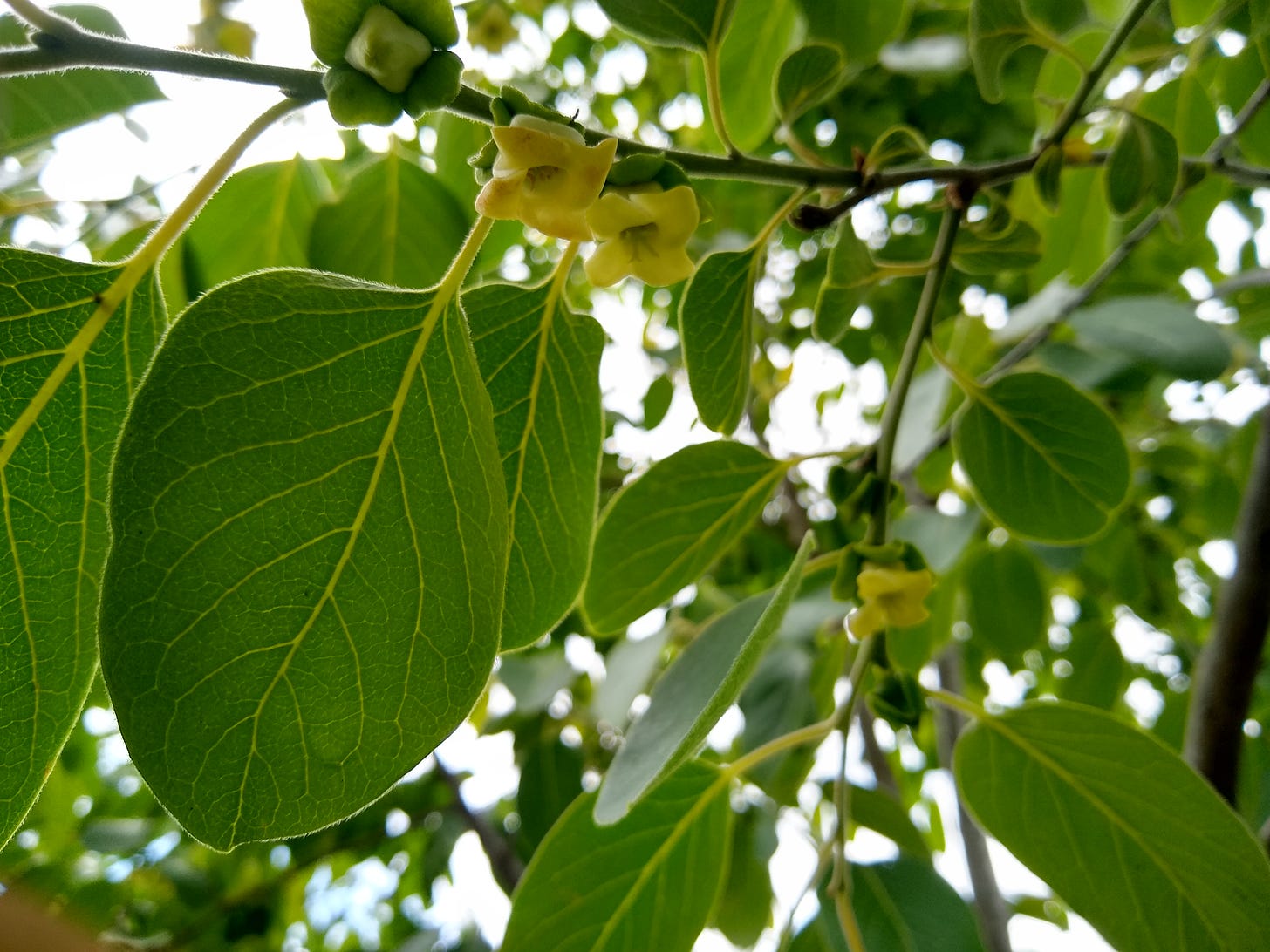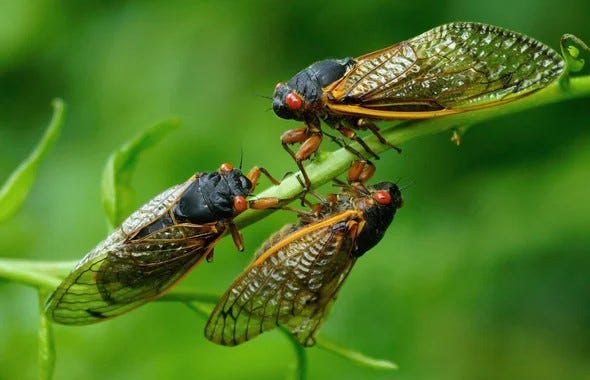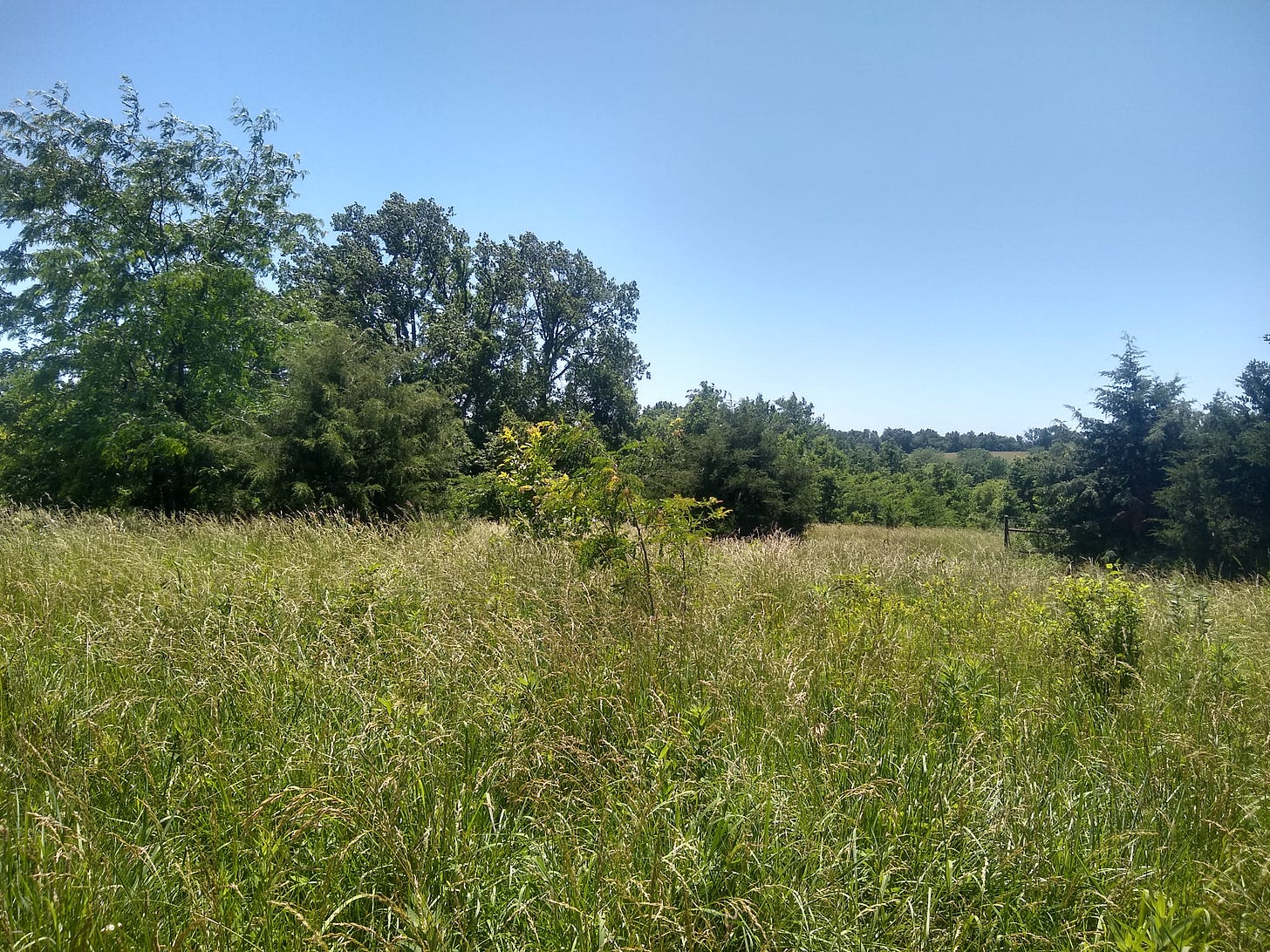A Minor Plague
A swarm, a stump, a silent scream
The mud of spring once held in hoofprints and field depressions, probed by eastern tailed-blue butterflies, has dried and sprouted– clover if we’re lucky, but mostly ragweed. Sharp, cloudless skies beat down in the afternoons and persistent winds press at the hedge limbs and thickening stalks of sunflowers, and the ever-encroaching thrum of periodical cicadas wraps around the pasture edges, gradually and then suddenly, like the verdant, prickle-lined arches of multi flora rose, ceaseless at the draw’s edge. We are passing into summer– into the big dry-off that begets the long days and torrid heat of yet another hottest summer on record (I’d be willing to wager).
There is no drought here, yet. The earth holds some rain, and lain in the embrace of sun-bleached grass mulch, the root hairs of sweet potato pierce the soft humus of the garden, soon enough to plumpen. ‘Neath rafters, barn door headers and tin roofs, paper wasp foundresses, not yet angry in the heat but nonetheless defensive, carry moist globules of plant fiber and saliva to form dangling gray nests, lined with eggs. In little time they will pupate, some clinging to their papery confines, others dropping free, or perhaps victimized by other predators of wasp nests.
Unlike the cruel death enacted upon humans by other humans, predation in the animal world, even of the young, would seem to be a mere part of the larger calculus, a balancing of the scales that we can scarcely perceive, divorced as we are from the order of our native biome. It’s strange to me that the natural balancing of predation, sustenance, and reproduction demonstrated by wasps and caterpillars and spiders and fish and tadpoles is so challenging to our human sentiment, when the cruelty we exact upon each other, largely in the name of capital and resource control, goes largely unacknowledged and unrecognized, at least here in the affluent Western world.
While the soil still holds water and the mornings are mostly dewy, we mulch. And I’m not talking about that strange, red-dyed manufactured bagged stuff for sale at the garden center. Taking my scythe out in the cool of the morning, I head out to where the grass has perhaps flowered but the seed has not yet ripened. I check by sliding the heads off a few stems and crumbling them in my hand, searching for the small, hardened seeds. Once I’ve found a stand of grass to be suitably free of germplasm, I mow, returning later in the day with a good pitchfork (I like a five tined fork for garden mulch), sliding it beneath the windrows, flipping the aromatic swaths of mowed grass into a cart to haul off.
Make no mistake about it– while I do like to extol the virtues of scythe mowing, this work would be wasted if not for the equally important dedication to picking up and moving the cut grass towards its highest purpose. When properly laid in place, a thick layer of long-stemmed, seedless grass mulch can retain moisture in the heat of summer, protect young transplants from harsh sunlight, and suppress annual weeds, without the cost of purchased straw. The past few mornings, the dew has burnt off quicker and quicker, and more and more of our cool season grasses are going to seed. Now is the time to mow and mulch. That which is too seedy for the garden can be trampled into thin pastures by the cows or used as path mulch, particularly those high traffic areas near the poultry which are inevitably pecked bare and strewn with shit.
The main pathway bisecting our homestead is crowded with clusters of fat and sleeping ducklings, their bulging crops filled with mulberries and cicadas. In the shelter of willows, they tuck their bills behind their wings and stretch their webbed feet, nipping at flies coming to share in the abundant windfall of fruit. Among the billowing seeding grasses, lush clover awaits the smacking, chewing maws of foraging swine, their lips and jowls and rooters stained green with chlorophyll. Goats laze in the shade of an old fencerow, the wire long torn out, rusted to bits and trampled into the thatch and clay, ruminating in the thin shade of cherry and elm, their guts full of bramble tips and autumn olive bark.
Even the ragged squirrels, thin from surviving on desiccated hedge balls in the fruitless emergence of early spring, have begun to return to proper condition as they scurry along pendulous, berry-laden limbs, their growing bellies glistening with health, their paws stained deep periwinkle with sticky juice. I have seen the scat of fox, coyote, and raccoon along my footpaths and deposited upon promontories of the savanna, the color of mulberry, streaked with seeds and thoraxes and lifeless bug eyes. In other words, the gittin’ is good, for the time being, particularly if you enjoy cicadas and mulberries, or are willing to eat them.
I have had a few cicada preparations thus far– breaded and fried, toasted in butter, and poached in a broth… they’re fine, but nothing to write home about– vaguely nutty but mostly hollow, they largely take on the flavor of what they’re cooked in. The wings and legs must be removed, and while many cicadas can be gathered, particularly in the cool of the morning, they still do not amount to much nutritionally or culinarily. I’m down to try anything, at least three times apparently, and yet I must admit I don’t care for the texture of cicadas, nor their aesthetics, as something I’m putting in my mouth. In terms of labor intensive wild food that is readily available right now, mulberries are the clear choice, though I have been considering the possibility of vacuuming some of these cicadas up and somehow drying and milling them as a storable poultry feed. I suppose if I don’t get it worked out in the next few weeks, I’ll have over a decade to consider the possibilities. For the time being, I am content to let the poultry take advantage of this emergence, as well as the heavy yields of mulberries.
The manic daylight of June allows little rest for industrious (or is it perpetually doomed to toil) folks like myself. I try my best to keep up with the necessities of grazing and gardening, being a present and caring father, repairing irrigation lines and electrical systems, scything swards of grass and picking up mulch and transplanting and handling the accruing buckets of human refuse that quickly disappear in the shade of sunchokes near the outhouse. I am behind by months on bills and billing and I’m beginning to feel like money is fake bullshit. For example, the outlook for rain in the near future is suddenly bleak, and I am unable to purchase any, regardless of the current state of my financial health. Money won’t buy rain, but labor can provide an extra layer of grass mulch to temper the dry weeks on the horizon.
The wind whips, harshly and consistently in the afternoon, leaving me hatless and dehydrated near the crest of this slope as I slog through the drying stems of grass-in-seed with my trusty wheelbarrow full of eggs from the wagons and nest-boxes, whey for the hogs, and sprouting corn and sunflower seeds. At four or five in the afternoon, the buzz of cicadas is cacophonous, deafening, exhausting, a collective wail and shriek that I cannot drown out with headphones. I find dozens of red-eyed beasts clambering on the soft, lively growth of Asian pears and hazelnuts. The dying tips of apple and hickory and thornless honeylocust that punctuate the chicken pasture thrash in the violence of rushing air, their undersides incised by the perforations of cicadas depositing their eggs, and it is here, among the screaming, chaotic whir that I park my conveyance and sit in the exoskeletal storm, face in my hands, and wish for an end to this minor plague.
Halfway expecting the Long Branch creek to run red with blood, or for a rain of frogs, I shift my boots in the drying dirt and raise my eyes from my palms. Not far from where I sit in this tempest of wings and chitin, flies and mulberry duck-shit, is the vague trace of a long-decayed stump, consumed by decades of ants. Judging by the location of the crumbling mound, and its current condition, I would estimate that it was cut fairly long ago, perhaps hand-sawed and pushed by the colonizing plow of the men who spilled blood on these prairies, cropped them ‘til millenniums of sweet and grassy earth were ripped and extracted and eroded and sent asunder on their way to become silt in some far delta, or the underlayment of growing dead zone in the Gulf of Mexico.
While the cicada plague may take some limbs and twigs on valuable trees I care for, and some may even die or fail to thrive until they die, it is the stumps and scars and storms that our own species is responsible for which plague us most. As farmers, even farmers working to conserve, restore, and steward local ecology, our work often feels like combat with the natural world. In the pages of this almanac, I have long attempted to portray a thing I truly feel, that deriving an equitable and righteous livelihood in relation to land requires us to join the ecosystem, become a link in the chain and an affected party in the larger ecological scheme. It requires that we somehow build a relationship with the flora and fauna and fungi and living soil of our biome, and that our legacy is not merely a stump subsumed by ants, some oxidized and crumbling barbed-wire and all that we stripped out and sold off. But even under “normal” and “natural” circumstances, becoming a member of the ecological community sometimes entails seeing the feather trail from a beloved turkey hen leading towards the fox den, the constant eruption of poison ivy blisters, and the seemingly very real possibility of losing either my hearing or an eye in the periodic maelstroms of cicada emergence. When I experience all the pain, discomfort, and fear that come with living under the undefined law of this ecosystem, compounded by the grief and anger of my marriage (til death do us part) to a global economic system that actively profits from the destruction of all communities, I want to scream, but no scream could ever rise above the ceaseless crying and wailing of this infernal choir of cicadas, and so instead, I sit with this stump.
I see the stump and I see a failure, a disconnection. Even now, encrusted in this stripped-down dirt I love, down out of the wind in the tall grass, one with the ticks and chiggers, earthy as it feels to sweat and bleed and urinate here daily, to have caught onto the rhythm of seasons and bird songs, and be witness to so much growth and decay– I am insulated from the consequences of the actions of this culture I benefit from. The fossil fuel economy which threatens to burn, drown, starve and displace those who live simply and with the least granted to them, an economy strategically aided and protected by militaries that have shown time and again that they will bomb tent camps and hospitals and schools full of refugees, directly benefits me and this project, while I whine about some bugs, some extra watering work, some minor crop losses, and a bit of burn out.
This work is hard, and the privilege of having access to arable land requires that I make it count. It has been an exhausting few weeks of toil on this old clay-stricken slope, and it’s difficult for me to see how seeking to restore such a small remnant of this melting, burning, flooding, warring world means a thing in what, by the extension of simple logic, seems to be the flailing final minutes of a global extraction economy in a murder-suicide pact with the planet.
After some moments spent in a sort of hopeless repose, buried in the shrieking fields, I rise from tick-flecked grass and shake the vulnerable limbs of young fruit trees in a futile effort to loosen the swarming cicadas actively implanting their eggs in the v-shaped furrows they’ve gouged into the stems. Two, three, four dozen bugs buzz off from any given sapling, regrouping somewhere down the line. A few intrepid chickens chase down a small handful, but the reproductive strategy of these creatures –sheer and sudden overwhelm– renders this effort, like so many others, meaningless. If I am to become native to this ecosystem, that is, if I even could, I will have to accept this calculated, if not cruel, wave of predation. It is, anyhow, preferable to the cruelties we’re trained to accept here in the thrashing death throes of a system with little left to extract and consume, a realm of stumps and graves, bulldozed down to the rising tide.
After the eggs are all collected and the livestock are all fed and watered, I tread back among the lazing ducks, fattened on soft fruit and crisp bug-flesh, and within the cool earthen walls of home, set myself down in a cradle of screamless silence.
Authors note: As always, much appreciation for your continued readership and support of this project— and yes, I’m aware that “screamless” isn’t a word, but it should be. At this point in time, I remain committed to the Almanac project for this year, and would like to continue for as long as I can dig deep for the right words, even if they’re invented. That said, I’ve had a book project in the works (that is, in my head) for some months now, and I have begun researching and outlining what will likely be a considerable undertaking. This new project and the Fox Holler Almanac may merge together at times, and I’m hoping to give supporting readers an opportunity to peek at the early stages of this project’s development, and give feedback. Taking this book project seriously is going to require some resources I do not currently have, so drop a coin in my hat if’n you have one to share.





